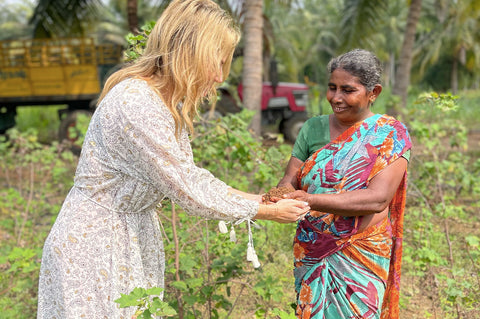
Fostering Circular Practices and Giving Back
Cleobella's Sustainability Journey: Fostering Circular Practices and Giving Back
Sustainability isn't just a trend for us at Cleobella—it's a core value that guides everything we do. From the circularity of our clothing to the initiatives embedded within our business practices, we're committed to making a positive impact on the planet and its people.
One of the cornerstones of our sustainability initiatives is our focus on circularity. We believe in keeping clothing within the supply chain for as long as possible, reducing waste and minimizing our environmental footprint. That's why we introduced a takeback program for our customers. Through this program, they can recycle their used clothing, ensuring that it either stays in circulation, gets upcycled, or undergoes responsible downcycling of fibers if they're no longer viable for use. By closing the loop on our clothing, we're working towards a more sustainable future.
Over 85% of all textiles end up in landfills, including clothing from resale and donation centers and what they can't sell gets trashed or burned, causing major social and environmental problems. Sadly it takes 200 Years for synthetic and chemical-treated clothing to decompose (and it leaches toxic chemicals) which is why Cleobella is committed to keeping Cleobella clothing out of landfills by designing products for circularity. The majority of our collection is organic, non-toxic, and can be recycled into new fabric. In addition, we design pieces that can be worn for generations and have partnered with ForDays to help collect, sort, and recycle used garments, linens and more, from any brand through our their Take Back Bag.
Cleobella is actively seeking opportunities to minimize its carbon footprint and reduce the use of virgin materials by incorporating recycled elements into its product line. For instance, the brand's swimwear collection now features fabrics made from recycled plastics, transforming waste into stylish and sustainable beachwear. Similarly, Cleobella's totes are crafted from repurposed materials, including discarded textiles and post-consumer plastics, offering eco-conscious consumers fashionable yet responsible choices. Even in their jewelry line, the use of recycled metals and sustainable sourcing practices highlights Cleobella's commitment to environmental stewardship. By integrating recycled materials across various product categories, Cleobella not only champions sustainability but also sets a benchmark for eco-friendly practices in the fashion industry.
In addition to our circularity efforts, we're also dedicated to giving back to our community and the planet. Through our partnership with Beam, we've implemented a giveback program that allows one percent of every purchase from Cleobella clothing on our e-commerce website to be donated to chosen charities.

Our giveback initiatives span a wide range of causes, reflecting our commitment to making a meaningful difference. We've supported reforestation projects, recognizing the vital role trees play in mitigating climate change and preserving biodiversity. Similarly, we've contributed to the development of coral reefs, recognizing their importance as ecosystems and barriers against coastal erosion.
Empowering women is another area close to our hearts, which is why we've directed our efforts towards supporting STEM programs and providing training opportunities for women to improve their livelihoods. By investing in women, we're not only fostering gender equality but also driving positive social and economic change.
Furthermore, we're actively working towards tackling plastic pollution in our oceans. To date, we've successfully removed over 36,000 pounds of ocean plastics, contributing to cleaner seas and healthier marine ecosystems.
Finally, we are also reducing our ecological footprint by producing GOTs certified products. Unlike its conventional counterpart, which heavily relies on synthetic pesticides and fertilizers, organic cotton production opts for natural methods that prioritize the health of the soil and the diversity of ecosystems. By steering clear of harmful chemicals, organic cotton farming significantly reduces soil and water pollution. This choice not only benefits the immediate environment but also safeguards delicate ecosystems, ensuring the preservation of essential habitats for numerous species.

At Cleobella, sustainability isn't just a checkbox—it's a commitment to continuous improvement and positive action. We're proud of the strides we've made so far, but we know there's always more work to be done. Together with our customers and partners, we're dedicated to creating a brighter, more sustainable future for all. Join us on this journey towards a better world.
To date, Cleobella has funded removal of 36,000 pounds of ocean plastics, planting of 8,400 fruit bearing trees in India, 200 meals for children and their caregivers at a clinical research hospital, and 40 sewing machines for female artisans in South Asia.
Find out more about our philosophy and giveback here.






